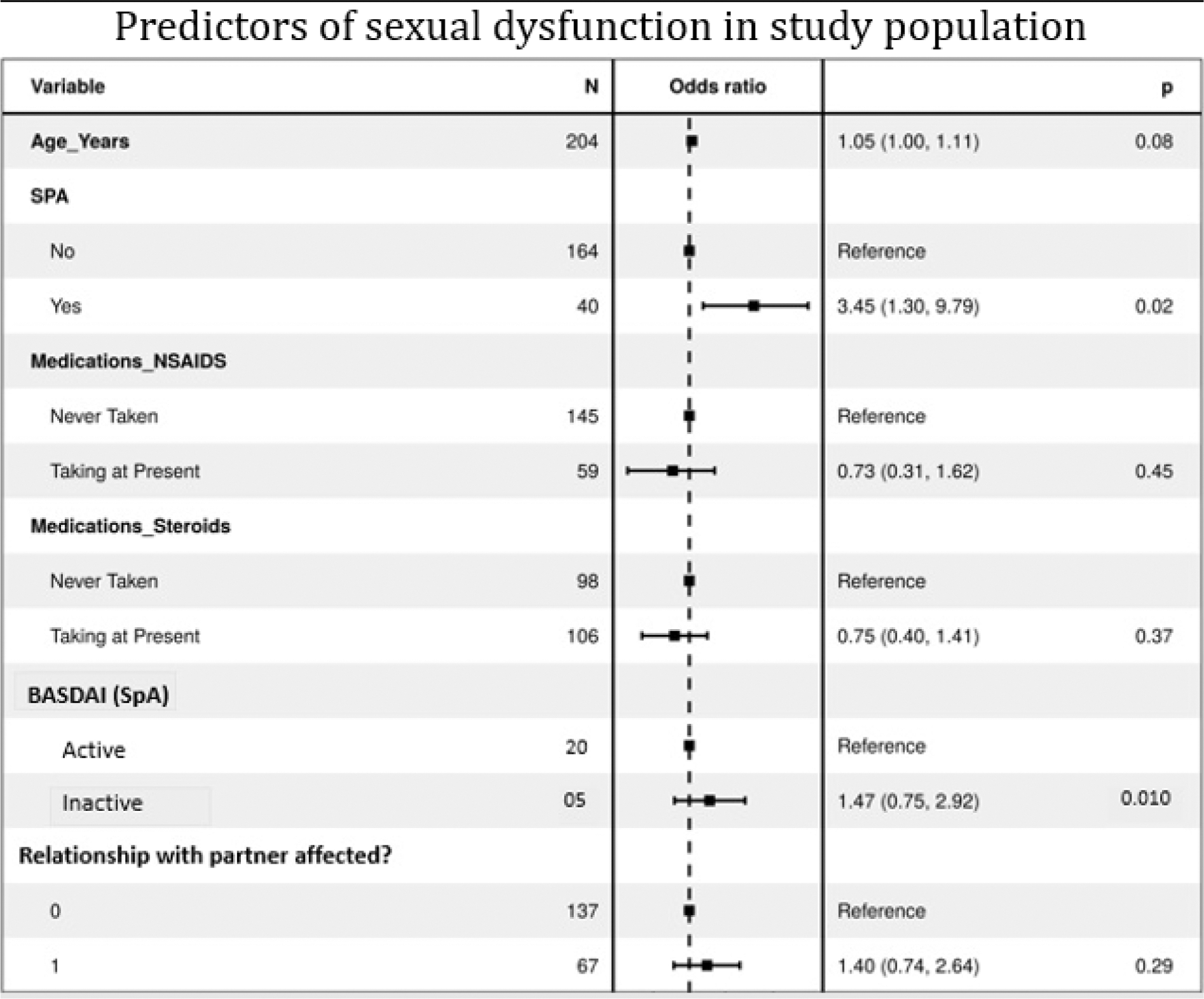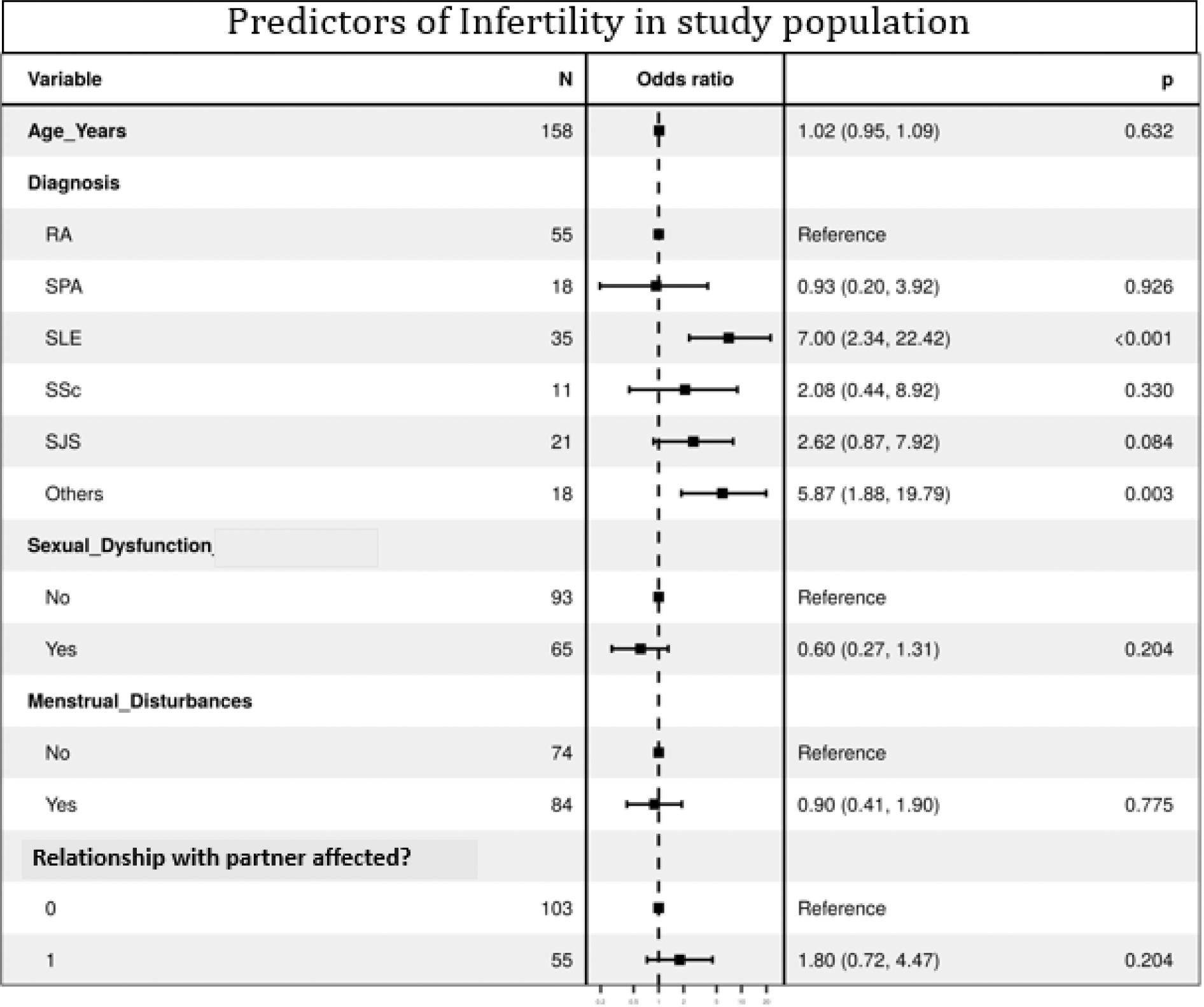

Background: Autoimmune rheumatic diseases (AIRD) are known to have female predilection and peak incidence in the reproductive age group. Disturbances in sexuality, menstruation, and fertility are commonly experienced by this population and various factors like active disease, teratogenic drugs, hormonal imbalance as well as other psychosocial aspects play a role.
Objectives: To study menstrual abnormalities, contraceptive practices, sexual dysfunction and infertility and factors influencing them in women of reproductive age group with Autoimmune rheumatic diseases.
Methods: 261 cases and 272 age matched controls were enrolled in a questionnaire-based study. Demographic details, type of AIRD, current disease activity, current medication, menstrual abnormality, contraceptive methods, and fertility issues if any; in the last 3 months were recorded cross-sectionally. The 3 components of the Female Sexual Function Index (FSFI) (Frequency, Desire, and Satisfaction) were chosen by a prior Patient public participation (PPI), taking into consideration the sensitivity of our population. Data was coded and recorded in MS Excel spreadsheet program. SPSS v23 (IBM Corp.) was used for data analysis
Results: The mean age and standard deviation for the study and control group were 32.56 ± 6.98 years and 28.36 ± 4.76 years respectively. Patients were divided into 6 groups in order of their frequency (Rheumatoid Arthritis (RA), Systemic Lupus Erythematosus (SLE), Spondylarthritis (SpA), Sjogren’s Syndrome (SjS), Scleroderma, and Others). The duration of illness in 2/3 rd of the patients was <5 years. Menstrual dysfunction was more prevalent in the cases vs control (χ2 = 66.592, p = <0.001). Oligomenorrhoea was the most common abnormality in cases (61%) followed by amenorrhea (16.7%). The use of NSAIDS and Steroids, particularly high-dose steroids was found to be a significant contributory factor in patients having oligomenorrhoea (χ2 = 14.131, p = <0.001). Sexual dysfunction was higher in cases when compared to controls (40.7% vs 28.6%, p=0.018). Patients with SpA having active disease reported higher sexual dysfunction than other groups (χ2 = 6.593, p = 0.010) with 69.9% of patients reporting decreased frequency due to pain followed by decreased desire. There was a significant difference in contraceptive practice in cases and controls (45.6% and 64.8% respectively, χ2 = 12.336, p<0.001). Contraceptive use was higher with younger age, high literacy, and in people having non-religious views. Lack of contraceptive counseling played a major role in not using contraception as reported by the cases. Infertility (failure to achieve a clinical pregnancy after 12 months or more of regular unprotected intercourse) was statistically higher in cases vs controls (χ2 = 19.683, p = <0.001). There was a significant difference in infertility amongst different groups, the highest being in SLE (χ2 =25.251, p = <0.001). Menstrual irregularity and disease activity did not affect infertility however, relationship with the partner and inadequate counseling to the patient’s partner played a role in patients who reported infertility.


Conclusion: Our study showed that women with AIRD have a high prevalence of gynecological disorders when compared to the general population, which is consistent with the previous studies. Oligomenorrhoea and amenorrhea are commonly encountered menstrual irregularities in these patients. NSAIDS and Steroids can delay or temporarily inhibit ovulation and are known to affect menstruation as also seen in our study. Pain and reduced mobility in Spondyloarthritis can significantly affect various aspects of sexuality as seen above. There can be various causes of reduced fertility in women with AIRD such as active disease, drugs like cyclophosphamide, methotrexate, etc. This was however not found in our study. The importance of effective contraceptive practice during active disease and while using teratogenic drugs needs to be emphasized. The management of female patients with AIRDs is a challenge for rheumatologists as they are faced with a myriad of issues pertaining to the quality of life and therefore needs a multidisciplinary approach with the gynecologist.
REFERENCES: NIL.
Acknowledgements: NIL.
Disclosure of Interests: None declared.